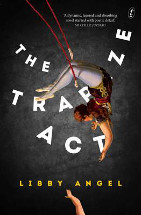The trapeze act by Libby Angel

Text, 2017. ISBN 9781925355925
(Age: 15+) Recommended. The trapeze act is a first novel by
Adelaide poet Libby Angel and is set in an unnamed but recognisable
Adelaide. It is about the influences exercised by family and place
on the development of character. It starts with the narrator,
Loretta, attending a retreat to 'find herself', 'to leave the past
and future alone and to concentrate on being'. Unfortunately her
mother's real and imagined words keep interfering, tying Loretta to
the past and reminding her of what her family is and who she is. And
so begins this novel with an eccentric cast of characters who make
up the narrator and this city we live in. Loretta is thirteen for
much of the action and daily life is unpredictable. Her father, a
successful and promiscuous barrister, is not interested in the past
but his family's story is spoken by journals that Loretta finds. Her
mother is the child of circus owners and is a performer in many
ways, maddeningly unpredictable both in everyday life and in the
stories she tells about circus life. She resolutely refuses to
conform to the stereotype of a mother, and eventually of a woman.
She has affairs, performs in plays thought to be scandalous and
shaves off all her hair. However, her eccentricities give Loretta
the ability to see through claptrap and to ignore stifling middle
class sensibilities. She endures her mother's capriciousness by day
and at night escapes from it by retreating into her
great-great-great-grandfather's journals. A mercantilist forced into
commerce by greed for ivory he journeys into the South Australian
hinterland as one of the earliest explorers but is thwarted by the
nature of the outback and is rescued by Aboriginal people. Loretta's
brother inherits his mother's disruptive spirit, even at one point
physically demolishing the family house. The mercantilist is driven
mad by the outback, Loretta's mother by the nature of the city,
perhaps, and conformity seems to be the way to survival. Yet the
novel is not dark or depressing; it is quixotic and unpredictable
and entertaining, like a good circus act. The language is at times
poetic and surprising, while nonetheless apt. It is recommended for
older readers.
Jenny Hamilton